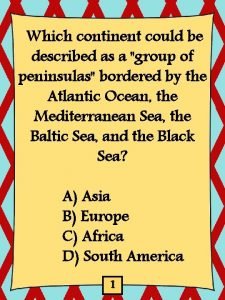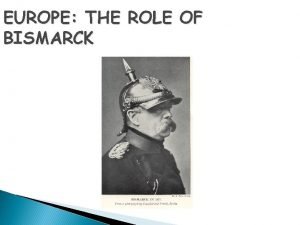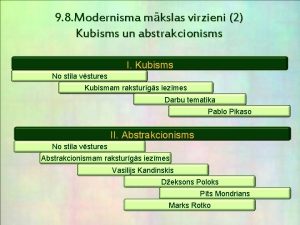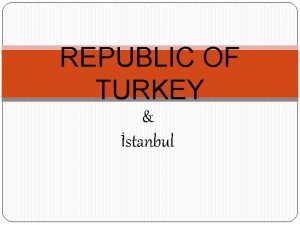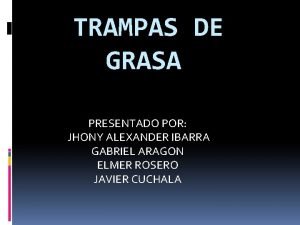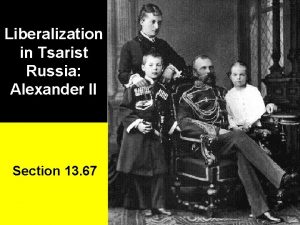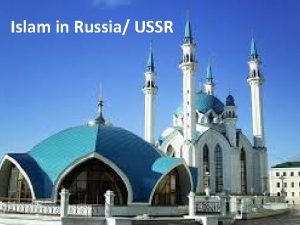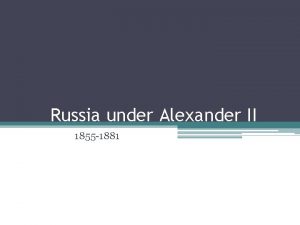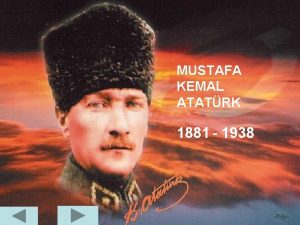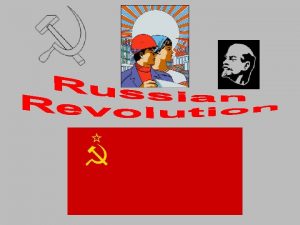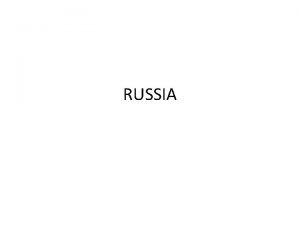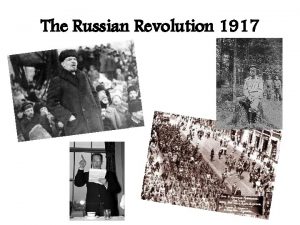TSARIST RUSSIA Tsarist Russia In 1881 Alexander III


























- Slides: 26

TSARIST RUSSIA

Tsarist Russia In 1881 Alexander III succeeded as Czar of Russia. He immediately became a ruthless Despot. (Despot is a fancy word for dictator. )

Tsarist Repression Everyone had to “fit in” with his vision of society. Those not in the Russian Orthodox church or spoke another language were “dangerous. ” So was anyone who questioned his authority.

Further Repression The Czar had all printed materials censored. His network of secret police spied on ordinary citizens. Teachers were forced to report on their student’s political activities.

A Uniform Culture The Czar wanted to make a single dominant culture. He oppressed minority groups violently. Intellectuals were considered dangerous. Jews especially were targeted for violence.

Pogroms were attacks on Jews organized by the Czar’s government.

Czar Nicholas II became Czar in 1894. He was no better than Alexander III. Completely out of touch, and blind to the Russian people’s problems.





The Winter Palace of the Tsars







When Nicholas took over, Russia was lagging far behind the rest of Europe industrially. Most of the Russian economy was still based on agriculture. England, 1880 Russia, 1880

Russia Industrializes Nicholas II wanted to catch up to Europe. He began to rapidly industrialize Russia. By 1900 Russia was the 4 th largest steel maker and began work on the longest railroad ever.


Costs of Industrialization In order to pay for this industrialization the Czar borrowed money from Europe. He also raised taxes on the poorest Russians. They really could not afford the new taxes.

Industrialization Stirs Discontent Industrialization brought unsafe working conditions, child labor, and pollution to Russia. This mainly effected the poor

In 1915 200, 000 workers and their families came to the Czar asking for reforms The Czar’s troops attacked the crowd killing several hundred unarmed people. Bloody Sunday

The Czar Resists Reform Nicholas was either unaware of the problems, or chose to ignore them. He refused to enact any kind of reforms to improve the lives of his people.

The Last Straw • Russia was losing WWI badly • No stalemate like western front • The Czar went to the front to lead troops • Shy and un-motivating • Eventually the army quit fighting
 Apollo with battling lapiths and centaurs
Apollo with battling lapiths and centaurs Hamlet act iii scene ii
Hamlet act iii scene ii Which letter represents the pyrenees mountains on the map
Which letter represents the pyrenees mountains on the map Designed alliances
Designed alliances 1973-1881
1973-1881 An emblem 1881 poem
An emblem 1881 poem The painter on 25 october 1881
The painter on 25 october 1881 What is the meaning of this
What is the meaning of this 1821-1881
1821-1881 1881 eiendom
1881 eiendom Pablo picasso (1881-1973)
Pablo picasso (1881-1973) 1881 jules ferry
1881 jules ferry Abstrakcionisms
Abstrakcionisms 1973-1881
1973-1881 Mustafa kemal ataturk
Mustafa kemal ataturk Hamiltons financial plan
Hamiltons financial plan In 331 bce, alexander the great successfully invaded egypt.
In 331 bce, alexander the great successfully invaded egypt. Alexander masser
Alexander masser Alexander moyzes diela
Alexander moyzes diela Nicole alexander md
Nicole alexander md Alexander sotirov
Alexander sotirov Lesson 9
Lesson 9 Alexander kolesnik
Alexander kolesnik Tactics and strategy
Tactics and strategy Alexander ibarra
Alexander ibarra Jeremy louis alexander
Jeremy louis alexander Alexander the great relationships
Alexander the great relationships


